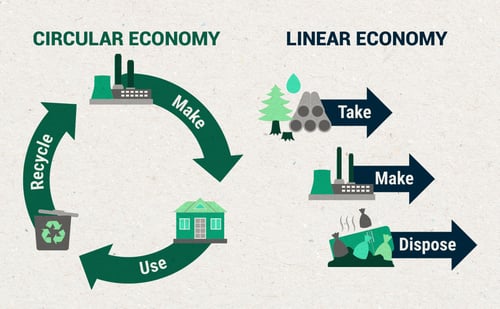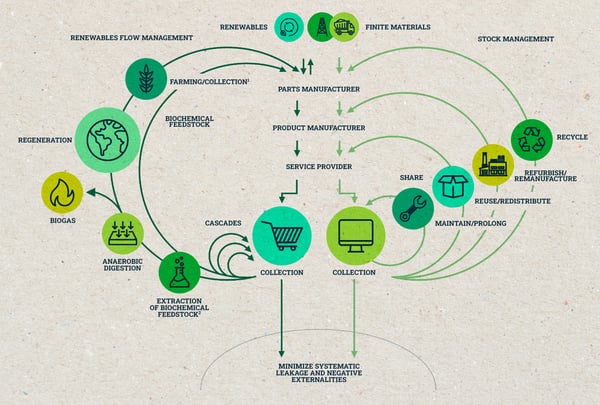Businesses today not only have to battle industry competition to stay profitable, but they’re also dealing with the financial impacts of operating more sustainably, ranging from the need to source materials ethically, maintaining a sustainable supply chain, and meeting the demands of sustainably-focused consumers by limiting their carbon footprint. As companies tackle these challenges, they are moving away from a traditionally linear model of creation and consumption and realizing the benefits of embracing circularity.

The benefits of transitioning to a circular economy include $4.5 trillion in economic benefits by 2030 as well as a 39% reduction in greenhouse gas emissions globally by 2050.
Those benefits can be realized by businesses through one of the core tenets of a circular economy: an effort to produce as little waste as possible. An efficient and sustainable waste management program is a critical step in establishing circularity. Leveraging waste management technology, like AI and waste metering, simplifies waste management while offering a number of economic and environmental benefits.
Read more from the Waste Watchers Blog!
waste management's role in circularity
In a circular economy model, businesses prioritizing better management of resources, including waste and byproduct materials, becomes a necessity. Applying the 5 R’s (Refuse, Reduce, Reuse, Repurpose, Recycle) to transition your operational waste and recycling program offers a starting point for various aspects of your company. Procurement teams can choose to buy only products that are heavily recyclable. Reducing dependency on single-use items or plastic packaging can mean less material needs to be dealt with.
Not only should the operational processes of a business be examined under the lens of sustainable waste management and steps be taken to address waste creation, but recycle, reuse, or repurpose programs should also be implemented for the byproducts a business is left with. In a circular economy, this material is seen as a valuable resource rather than a problem. Proper collection and reprocessing of materials allows for them to be used again as feedstock for less cost-intensive creation of new products.

Discarded consumer products comprise 75% of municipal solid waste, and 80% of that is burned, landfilled, or dumped because of poor end-of-life options for the materials. Rather than sending this material to a landfill or incinerator, where it contributes to greenhouse gas emissions, using it as a resource closes the circular economy loop. Identifying what can be recycled and reused in this discarded material ultimately reduces the volume of waste and the impacts of material extraction on the environment.
Effective and sustainable waste management programs are a significant yet easily addressable step in the process of ensuring materials are used to their fullest extent possible, and in turn, being a steward of environmental and fiscal responsibility.
impacts of better waste management in circularity
Adopting circular solutions allows businesses to realize the environmental benefits of their efforts. This can include conservation of natural areas due to a reduction in mining activities for finite resources. Businesses urgently adopting transformational circular solutions can cut material waste across industries and supply chains. Greenhouse gas emissions, notably those associated with sending waste to landfills, can also see dramatic reductions with materials staying in circulation to be used as efficiently as possible. These outcomes are shown to positively impact ESG factors, potentially raising the profile for businesses.
But an important and driving factor for businesses is that embracing sustainability when it comes to waste and recycling also carries a number of economic benefits:
Reduced Resource Costs:
Efficient, sustainable, and circular waste management can reduce the costs associated with resource extraction. An optimized management program also has the potential to reduce operating costs. For instance, Unilever achieved zero-waste-to-landfill goals across all of its 240 factories in 67 countries. The company announced its waste diversion efforts saved more than $225 million with byproducts being turned into low cost building materials, compost, and materials used for paving roads. Additionally, sixteen businesses in the town of Kalundborg in Denmark worked together to form a closed loop system in an industrial park, realizing one’s leftover materials could be valuable resources for another company in the 1970s. By 2011, participating companies had accumulated an estimated $310 million in resource savings since the project began.
Volatile Commodity Price Insulation:
Businesses that adopt circular waste management solutions can avoid volatile commodity prices. Reducing dependence on a fluctuating market by mining industry byproducts allows a business to be insulated from large swings in prices. Interface Inc., a global flooring company, initiated a closed-loop recycling system for carpet tiles. The company is able to rely less on virgin raw materials such as nylon, can ensure a steady stream of resources to create new tiles, and produces a carbon neutral product. Interface was able to save $405 million, cut energy use by 44%, and use 24% recycled raw materials.
Greater Consumer Appeal:
Choosing an operational waste and recycling management system based on circularity appeals to consumers who value sustainable companies. When surveyed, 78% of US consumers reported a sustainable lifestyle was important to them. Clothing company Patagonia created its Worn Wear program in which consumers can trade in used clothing to receive credit for new products as well as repair and reuse clothing items instead of buying new. The company had sold an estimated 120,000 repurposed items by 2020. Patagonia’s annual sales are estimated at more than $1 billion annually and its secondhand clothing enterprise saw a “record year” for sales in 2020.
When surveyed, 78% of US consumers reported a sustainable lifestyle was important to them.
Reduced Waste Services Costs:
Reduced costs related to waste services also happens as a result of adopting sustainable waste management programs. Implementing reuse and recycle programs reduces the total volume of waste that needs to be collected and disposed of, resulting in lower waste disposal and collection costs.
Waste and recycling strategy experts, like RoadRunner, are able to comprehensively analyze your entire operations to identify additional recycling and circularity optimization opportunities which results in significant cost savings. Businesses working with RoadRunner are able to achieve an average of 15% savings with operational waste and recycling management programs.
Here's how to read those symbols on plastic containers!
technology is making it easier than ever
Waste is responsible for an estimated 20% of global methane emissions. Implementing technology tools, such as AI, machine learning, and blockchain development, at various points across the lifecycle can provide the needed lift to manage waste better in a circular economy. For instance, RoadRunner implements AI-powered Waste Metering technology at the point of disposal to be able to identify the types and volumes of waste being generated either at one location or across an entire business portfolio, allowing for full scale recycling optimization. Other technologies such as Blockchain can track materials through a product’s entire lifecycle and ensure it’s sourced ethically. There’s even advanced sorting recycling technologies that are able to sort materials downstream.
Smart technology tools are providing businesses with the ability to improve waste collection and processing, recycle better, and manage resources in the most efficient and cost-effective manner possible.
Here are answers to some common recycling questions!
partnering with roadrunner in circularity
Partnering with a company like RoadRunner that can create a custom, tailored waste management program that fits the needs of your operations offers a way to implement the fundamental system change of a circular economy. Prioritizing waste reduction, recycling, and reuse of materials can sever the connection between economic activity and the depletion of the environment’s finite resources. Your business’s operational waste and recycling management profile becomes more resilient and regenerative as a result.
